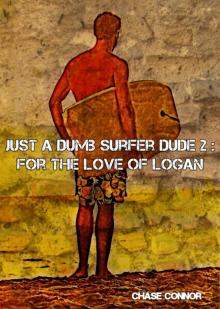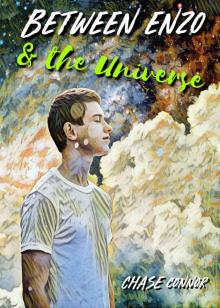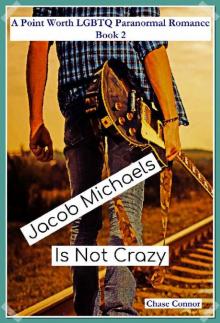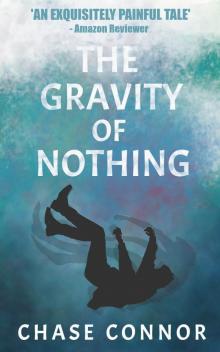- Home
- Chase Connor
Between Enzo and the Universe Page 4
Between Enzo and the Universe Read online
Page 4
“I didn’t spit on them.”
Smiling, I held up a hand.
“Non,” I said, then corrected myself. “Thank you. That is kind.”
“So,” his brow furrowed, “is that a ‘no’ or a ‘yes?’”
Shaking my head slightly, unable to keep a small smile from gracing my lips, I tried to mentally process the best way to express myself.
“I did not help you for free food.” I finally managed.
“I didn’t bring you free food for your help.” He replied quickly. “I brought you free food because I have too much. So, I’m not being all that nice, really.”
Again, I found myself frowning, considering this American and his offer of free donuts that my stomach was desperately trying to convince me to eat. The basket of donuts jiggled before me once again as I stared into his chocolatey eyes.
“I’ll have to throw them away if you don’t take them.” He said. “And that will mean that I wasted money anyway, then it means that your help was pointless.”
Over the American’s shoulder, I saw the donut vendor glaring at me. For that reason alone, I slowly slid a hand out of my pocket, and tentatively accepted the basket of fried dough and sugar. Both my stomach and I wanted to do anything possible to rub salt in the vendor’s wound.
“Thank you.”
“Vous êtes les bienvenus.” He replied awkwardly.
I merely smiled as I held the basket piled high with the treats.
“That probably wasn’t great, was it?” He laughed.
“De rien.” I said.
“What?”
“It is the same thing but easier to say.”
“De rien.” He parroted, and the attempt was admirable but imperfect.
“Very close,” I said simply.
“Thank you.” His head bowed slightly before he reached for one of the donuts in his basket. “You’re not from Québec.”
“No.” I managed, though I suddenly could not bring myself to eat a donut in his presence, no matter how much my stomach screamed for it. “I am from France. I am Québécois now.”
The man appraised me as he took a bite from the donut, which only made my stomach churn more violently.
“Immigrant,” He said. “Your English is accented. Most of the people around here don’t have an accent when they speak in English.”
“This is true.”
What else could I say? That I knew my French accent made my English atrocious at times? That, often, even Québécois had difficulty understanding my English? That even my French was often mocked due to the fact that it was not precisely the same as my new countrymen and women? Admitting that I had an accent while most others did not was the only reasonable response.
The American popped the other half of his first donut into his mouth, chewing hungrily before reaching down to swipe his hand over the side of his pants like the fluttering of a bird’s wings. He held his hand out with a smile formed around a mouthful of dough and sugar.
“I’m Peter.” He said.
“I am Enzo,” I said simply, almost forgetting to extend my hand.
Finally, I jerkily reached out and took his hand.
“It’s nice to meet you, Enzo.”
The man, Peter, smiled warmly as he swallowed his bite of food and shook my hand excitedly. The way that Americans do, which forced me to smile in return. Before it became imprudent, I slid my hand from Peter’s and forced it into my pocket.
“Your hands are cold.” He reached for another donut. “Are you going to eat yours?”
He gestured at the basket of donuts I held in my hand, close to my chest, as though afraid that I would lose them but also unsure of what to do with them. Peter was the type who stood closely to the person with whom he was speaking, but not so close as to invade their space. His tone was confident and measured while still sounding excited and friendly, no arrogance apparent. Our closeness allowed me to smell his cologne, which was warm, exotic, and musky, expensive and tasteful, and I could tell he knew how to apply such a thing without overdoing it. While he did speak with food in his mouth, he didn’t try to chew and speak at the same time. I loved Americans. They were the antithesis to Catholic guilt—bold and unapologetic. Friendly and warm.
“Yes,” I responded robotically, unsure of how to answer his first statement. I pulled my hand out of my pocket and reached for a donut, my stomach screaming out in victory. “Thank you once more.”
Peter was already shoving the rest of his second donut into his mouth when I bit into my first donut. Sugary sweetness assaulted my tongue and lips, somehow both velvety and gritty at the same time, as warm liquid jam oozed from the donut. My eyes nearly rolled back into my head as I tried to remember the last time I had been able to have such a treat. Overwhelmed by the sensations flooding every fiber of my body, I had to force myself to not shove the entire donut in my mouth and swallow it whole. Then the next and the next and the next until the basket was empty and confectioner’s sugar decorated my face in splotches, and jam stained my lips, leaving me looking like an Auguste clown in the middle of the festival.
“They’re not bad,” Peter suggested before leaning in conspiratorially. “But he’s obviously way too proud of them, right?”
I couldn’t help but laugh at that as I quickly stuffed the rest of the first donut into my mouth and reached for a second.
“There’s this donut shop where I’m from.” He continued as I took a ravenous bite of my second donut, almost forgetting Peter was there. “And you can get these jelly-filled donuts, kind of like these. Covered in powdered sugar. They’re much bigger and not as round as these. One of ‘em will cost you like, a buck, but they’re nearly gourmet quality compared to this guy’s attempt.”
I gave an amused snort, sending up a cloud of sugar, which made Peter laugh. Though I felt I should apologize, I instead chose to stuff the second half of the donut into my mouth and reach for another.
“They’re always the best first thing in the morning,” Peter said, obviously aware that I was not going to add to the conversation until I had eaten the donuts. I knew I probably seemed rude, but I was just so hungry. “You have to go pretty early, like four-thirty or five o’clock. But they’re warm and gooey. They’ll melt in your mouth. Sometimes, if you get them really fresh, the jelly is so runny from having just been squirted into the donuts that it’s messy as hell, but it’s so worth it. I’ve ruined more shirts getting those donuts on my way to work.”
My basket was nearly empty, such was the speed with which I inhaled my treats. Peter said nothing, but his eyes danced between the basket of donuts and my mouth, obviously aware that I was hungrier than I had initially admitted. I felt like a slob. Rude and boorish as I shoved donuts in my mouth, barely chewing before choking them down, simply wanting to fill my belly so that it would stop being angry with me. I was more than happy to simply listen to anything the friendly American had to say as I filled my gut with the food it so desperately sought. Peter could have told me that he was a serial killer and then laid out his modus operandi for selecting his victims, and I would have listened intently as sugar, dough, and jam slid down my throat.
“Do you want something to drink?” He asked when I shoved the last donut into my mouth, holding his basket with his remaining donuts out to me. “Because I would really like some coffee.”
I eyed the basket in his hand as I licked my lips and rudely choked down the food in my mouth. Without hesitation, I took the food from him, sliding his tray into my empty one, and reached for my next donut. Peter watched as I scarfed down his remaining treats, in no rush to get a response to his proffered question. It seemed like only seconds before I was stuffing the last donut into my already full mouth, chewing and choking down bites of food like an animal. When the last bite of the donuts was sliding down my throat, my lips sticky and my mouth tingling from the sugary sensation, my throat raw from nearly swallowing the food whole, I looked up at him.
“Maybe a café?” He asked. “I could
use a sandwich or something. A real dinner might be a good idea. Too much sugar and not enough real food and—”
He gave an exaggerated, jittery shake of his body.
“I am sorry.” I slid my sweater sleeve over the back of my hand again, reaching up to wipe my mouth clear of sugar. “They…they were just so delicious.”
He smiled.
“You probably need some real food, too.” He suggested. “Something not made of fried dough and sugar, huh?”
I chuckled, suddenly nervous around this attractive American and his easy way of speaking with someone who was a stranger. Peter waited patiently for me to respond as though the night was not creeping in around us, the sun slowly going to sleep in the distance. It was as if he had nothing better to do than wait and see what I would have to say in response to his question. Though my parents had been patient people, most other people I had encountered up until that point in my life were not patient enough to wait for a basket of donuts at a festival, let alone give me time to make up my mind as to what I wanted to say. In English.
“I am actually trying to find a coat,” I said, finally. “This is why I came to the festival.”
Peter nodded slowly, as though suddenly understanding something.
“Oh.”
“Yes.” I gestured. “I was going to buy a coat from the vendor there, but someone just bought it.”
“That’s too bad.”
I nodded in agreement.
“I am sure I can find another vendor, though.” I began looking around, the empty baskets still in my hand. “I do not want to have winter come and not have a coat.”
“Going to a store would be easier.” He said.
I ignored his statement, knowing that I would have no luck finding a decent coat in an actual store and still have money left over for more food. Maybe a thrift shop wouldn’t be out of the question, in fact, it was a good alternative to the festival if I couldn’t find anything. Of course, with nighttime approaching, I would have to wait until the following day to visit a thrift shop if things at the festival did not turn out in my favor. One night without a coat would not be too unbearable, though I had often used my brother’s coat for extra warmth at night since I was reticent to complain about the temperature of the apartment. My bills were already too high to allow myself the luxury of an apartment that was comfortably warm. I hoped that I would be able to sleep well, not having the coat at night like I had for the previous several months. It would feel odd sleeping once I finally went to bed again.
“Yes.” I agreed though I offered no further explanation.
Peter was watching me once again.
“Thank you again,” I said suddenly, realizing that I was wasting time. “For the donuts. They were very good.”
“Made ‘em myself.” He winked.
For some reason, I found that very funny. Peter’s eyes lit up as I laughed at his joke, as poor as it was. American humor, at its funniest, is nonsensical.
“You are a very good chef,” I said, licking at the corners of my mouth.
“You got it all with your sleeve,” Peter said. “Though I don’t think much escaped your mouth.”
Again, I was laughing, though this time, I felt warmth in my cheeks from embarrassment.
“I was very hungry,” I said. “I am sorry.”
“I’m glad you enjoyed them.”
“I did,” I said. “Thank you.”
“You don’t have to keep thanking me.”
I had no response to that. No one I had ever met had said that “thank you” was not necessary when they showed you a kindness. Of course, my experience with Americans—while almost always pleasant, if not wonderful—was limited. Maybe it was uncommon in America for people to say “thank you” for something such as receiving food when you were obviously hungry. Peter tentatively reached out and took the empty baskets from me, but even that gesture seemed confident and controlled. I felt that Peter did not often find himself in situations where he felt completely out of his depth.
“I can throw these away.”
“Thank you,” I said, then cringed before a smile bloomed on my face. “That is nice of you.”
Peter chuckled. “It was the least I could do.”
As though neither of us had ever encountered another human being before, thus had no experience to guide us in how to proceed in finishing our interaction, we just watched each other. Peter continued to stare at me with his warm, curious gaze as if trying to figure out some riddle that I had posed. As the moments passed and the two of us simply stared at each other, I became more and more self-conscious of how I must have looked compared to my impromptu dining companion. Peter wore dark, stylish jeans, immaculately pressed and cleaned, stylish shoes made of what looked like actual leather (though I tried not to let my eyes wander over his body too obviously), the stylish, black wool peacoat, and the chunky gray scarf that had been wrapped around his neck in a Devil may care way. With his expertly styled and sleek hairdo, I felt insecure, and though that was not uncommon for me, the feeling was intensified when I realized how attracted I was to this man. My body began trying to make itself smaller like it had inside Mr. Paquette’s makeshift classroom.
Peter gazed upon me, his lack of fear at being in that bubble of silence we had created emboldened me further.
“You can go with me to find a coat if you would like,” I suggested nervously. “Then I can show you to a café for your dinner.”
My companion smiled, the corners of his eyes showing their slightly crinkly skin once more, which brought a smile to my face. Peter made a grand gesture with the empty baskets, as though to imply that I should lead the way. A cloud of leftover confectioner’s sugar rose into the air between us suddenly, making the two of us laugh and step back so as to not get covered in the powder, which would have been impossible to brush away. Especially from his black wool peacoat.
“Maybe I should throw these away first?” He suggested, coughing as he waved the cloud out of his face.
“That might be best.” I laughed with him.
Before we left to find a coat, we found a trashcan, and in a silence pregnant with the curiosity we had for each other, we strolled away in search of a clothing vendor.
A Cross and Guilt to Bear
Kneeling, whether on the floor of the chapel or upon the kneeler attached to the pew in front of the row I had chosen, always left my joints sore and tight when my prayers were done. This wasn’t because I spent an exceptionally long time praying, but because kneelers don’t particularly do the job well for which they were designed. The old church that my family went to while we lived in France had attached a strip of cushion along the thin boards so as to make the experience a little less intolerable, though it didn’t quite achieve its goal. In Montreal, the chapel I visited to say my daily prayers hadn’t bothered with the comfort and slight luxury that a cushioned kneeler would provide. In fact, most of the pews did not have kneelers attached to the back of them at all. One was expected to kneel on the hard ground to say their prayers or stay seated in the equally hard pew to do the task. All one had to do was decide which part of their anatomy they wanted to punish.
At its core, being a Catholic is about suffering and being uncomfortable. Not to say that Catholicism is bad, nor do I mean to speak ill of my former religion, but you cannot be Catholic and expect to be comfortable often. Even in a family such as mine, where Catholicism and all of its tenets were more of a guideline than a strict rulebook, and we were much more liberal than the church found acceptable, there was discomfort. Guilt is the way most Catholics make themselves feel uncomfortable. It is our most popular drug. We feel guilty if we do not say enough prayers throughout the day. We feel guilty if we do not follow every teaching of The Bible—though no one seems to be quite sure which version we are supposed to be following—so we try and fail to follow them all. We feel guilty if we say something even slightly harsh about our parents. All day long, we weigh our souls down with guilt, and then we say our ni
ghtly prayers to ask for forgiveness for our guilt. As soon as we say our “Amen,” we realize that we didn’t ask the Lord to look over our mother and father and brother and sister, so the guilt begins again. If you do not feel guilt all day long, you are probably not a Catholic.
You also have to use the Lord’s name in vain often, though you have to be sure that you are egregiously offended when you hear someone else do it.
Those are just the rules.
Often, I would find myself kneeling in church, either during one of the many services Catholics are expected to attend or just during my daily prayers, wondering if I felt guilty enough. Not because of something I necessarily did but for things that made me not worthy of God’s love. Catholics are often told that we are imperfect beings, that we must constantly ask for God’s forgiveness for one perceived slight or another. For some minor infraction we have committed without even knowing it or meaning to, which doesn’t really matter.
My level of guilt increased exponentially when I was thirteen-years-old. That was when I first realized that I had no romantic interest in girls and that only boys aroused me. It was also the year that I discovered masturbation—on my own, of course, because, as I’ve said, my family was Catholic. So, feeling an attraction to boys made me feel guilty, but I also found that I had no interest in actually doing anything sexual with another boy, so I felt guilt about that, too. Why would I shame myself in the eyes of the Lord by being attracted to boys but only half-ass my offense? The Catholic version of God is so easy to offend, and I couldn’t even adequately do that.
Being gay was a concept I was vaguely familiar with, so I knew what it meant when I felt attraction to boys. But the term “demisexual” hadn’t even been coined then, so I had no idea that one could be gay with a hyphen. Of course, being Catholic, all you are taught is that there are gays, lesbians, and “normal people.”
Guilt, guilt, guilt.
My time spent praying stretched out longer and longer during the thirteenth year of my life, though I wasn’t sure what I was doing when I prayed for forgiveness for being gay. I was not actively gay, and no one had exactly provided a reason why being gay was a mortal sin, so my prayers were lengthy and vague. God, please forgive me for being gay. I don’t really know what being gay is all about, and I haven’t even touched another boy in the way that I am supposed to touch girls. Please do not hate me, God. Please let my parents still love me. That was my vague prayer that was repeated in my head ad infinitum from the moment my knees hit the kneeler until I rose once more and then in my head as I made my way home. While I ate dinner, while I had my nightly bath, while I told Noe a goodnight story, when I told Mom, Dad, and Grandmother “goodnight,” and then as I drifted off to sleep.

 For the Love of Logan
For the Love of Logan A Surplus of Light
A Surplus of Light Jacob Michaels Is Tired (A Point Worth LGBTQ Paranormal Romance Book 1)
Jacob Michaels Is Tired (A Point Worth LGBTQ Paranormal Romance Book 1) Between Enzo and the Universe
Between Enzo and the Universe Jacob Michaels Is Not Jacob Michaels (A Point Worth LGBTQ Paranormal Romance Book 3)
Jacob Michaels Is Not Jacob Michaels (A Point Worth LGBTQ Paranormal Romance Book 3) Jacob Michaels Is... The Omnibus Edition: A Point Worth LGBTQ Paranormal Romance Books 1 - 6
Jacob Michaels Is... The Omnibus Edition: A Point Worth LGBTQ Paranormal Romance Books 1 - 6 Jacob Michaels Is Not Crazy
Jacob Michaels Is Not Crazy Summer Hearts
Summer Hearts Jacob Michaels Is Trouble (A Point Worth LGBTQ Paranormal Romance Book 5)
Jacob Michaels Is Trouble (A Point Worth LGBTQ Paranormal Romance Book 5) Just a Dumb Surfer Dude
Just a Dumb Surfer Dude The Gravity of Nothing
The Gravity of Nothing